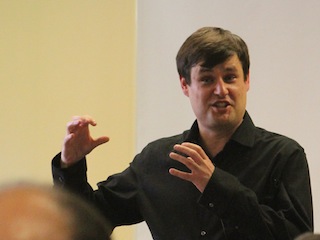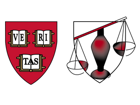Search Results for ‘nielsen’
Consider the Polymath Project, an ongoing experiment in “massively collaborative” mathematical problem solving. The idea is to use online tools like blogs and wikis to collaboratively attack difficult mathematical problems. Michael Nielsen — author of the book Reinventing Discovery and an advocate of open science — discusses how online tools like the Polymath Project can be used to transform the way we humans work together to make scientific discoveries, and how the normally conservative scientific culture can become more open.

Click Above for Video
…or download the OGG video format!
More info on this event here
October 25th, 2011
Consider the Polymath Project, an ongoing experiment in “massively collaborative” mathematical problem solving. The idea is to use online tools like blogs and wikis to collaboratively attack difficult mathematical problems. Michael Nielsen — author of the book Reinventing Discovery and an advocate of open science — discusses how online tools like the Polymath Project can be used to transform the way we humans work together to make scientific discoveries, and how the normally conservative scientific culture can become more open.
 Download the MP3
Download the MP3
…or download the OGG audio format!
More info on this event here
October 25th, 2011
Aaron Shaw – Polanyi’s Penguin? Commons-Based Industry in the Neoliberal Knowledge Economy
A renowned group of social and political theorists have argued that Commons-Based Peer Production (CBPP) and the spread of non-rival informational goods could eliminate North-South inequalities in the knowledge-based economy (see, for example, Benkler 2006; Weber 2004). Some of them have even gone further to depict non-rival knowledge production as an oppositional response to Neoliberal Globalization consistent with Karl Polanyi’s (1944) theory of “The Double Movement” and a “disembedded” market economy (Evans 2005; Jessop 2007; O’Riain 2006; Weber and Bussell 2005). In this talk, Shaw traces the theoretical bases of these claims and revisit the relationship between CBPP and the market in the context of the global Information Technology industry. He argues that the logic of production underlying commons-based innovation strategies in the field of IT does not contradict ideologies of the free market. Building on the Polanyian critiques of global neoliberalism, he proposes an alternate framework for assessing commons-based industry and commons-based development policies along the dimension of “embeddedness.”

Rasmus Kleis Nielsen – Mundane Tools and Mobilizational Practices in Two U.S. Congressional Campaigns
The mobilizational potential of the Internet has been highlighted both by both social scientists and professional practitioners. A wide range of new tools have become ubiquitous in political campaigns—ranging from state-of-the-art websites to something as prosaic as email. But we still do not know what internet elements are most important for mobilizational practices. Based on participant-observation in two congressional campaigns in the United States, web research, interviews with professionals and activists, and analysis of secondary sources, Nielsen argues that it is not campaign web sites as such, or the Internet in general, but specific “mundane mobilizational tools”, particular things like email and search, that are most intimately involved in mobilizational practices. Contrary to the specialized and emerging tools that have received the most scholarly, professional, and journalistic attention, mundane mobilizational tools are not designed specifically for political use, but instead derive their affordances from the fact that they (1) connect with existing infrastructures and communities, (2) allow distributed communication, and (3) are already familiar to users.

May 26th, 2009
Aaron Shaw – Polanyi’s Penguin? Commons-Based Industry in the Neoliberal Knowledge Economy
A renowned group of social and political theorists have argued that Commons-Based Peer Production (CBPP) and the spread of non-rival informational goods could eliminate North-South inequalities in the knowledge-based economy (see, for example, Benkler 2006; Weber 2004). Some of them have even gone further to depict non-rival knowledge production as an oppositional response to Neoliberal Globalization consistent with Karl Polanyi’s (1944) theory of “The Double Movement” and a “disembedded” market economy (Evans 2005; Jessop 2007; O’Riain 2006; Weber and Bussell 2005). In this talk, Shaw traces the theoretical bases of these claims and revisit the relationship between CBPP and the market in the context of the global Information Technology industry. He argues that the logic of production underlying commons-based innovation strategies in the field of IT does not contradict ideologies of the free market. Building on the Polanyian critiques of global neoliberalism, he proposes an alternate framework for assessing commons-based industry and commons-based development policies along the dimension of “embeddedness.”
 Download the MP3
Download the MP3
Rasmus Kleis Nielsen – Mundane Tools and Mobilizational Practices in Two U.S. Congressional Campaigns
The mobilizational potential of the Internet has been highlighted both by both social scientists and professional practitioners. A wide range of new tools have become ubiquitous in political campaigns—ranging from state-of-the-art websites to something as prosaic as email. But we still do not know what internet elements are most important for mobilizational practices. Based on participant-observation in two congressional campaigns in the United States, web research, interviews with professionals and activists, and analysis of secondary sources, Nielsen argues that it is not campaign web sites as such, or the Internet in general, but specific “mundane mobilizational tools”, particular things like email and search, that are most intimately involved in mobilizational practices. Contrary to the specialized and emerging tools that have received the most scholarly, professional, and journalistic attention, mundane mobilizational tools are not designed specifically for political use, but instead derive their affordances from the fact that they (1) connect with existing infrastructures and communities, (2) allow distributed communication, and (3) are already familiar to users.
 Download the MP3
Download the MP3
May 26th, 2009
 Listen:or download | …also in Ogg
Listen:or download | …also in Ogg
The market for recorded music has undergone at least three major reinventions since the dawn of the Internet. At the turn of the century illegal downloading ate away at the music industry’s bottom line. Then the iTunes music store made it easy to buy music again, albeit disaggregated from its album form.
Then along came streaming. The combination of ubiquitous Internet connectivity and bottomless consumer appetite for music has led to the success of applications like Pandora, Spotify, and Rdio which allow users to access entire music catalogs from virtually anywhere for next to nothing.
Streaming has worked. In 2014 alone, at least 164 billion tracks were played across all streaming services according to Nielsen. And these streaming companies are raking in incredible amounts of cash from advertising and user subscription fees.
Where does the money go? A recent study from Berklee College of Music’s Institute for Creative Entrepreneurship showed that 20 to 50 percent of music revenues might never make it to their rightful owners. In some cases artists might get 20% or less of the already tiny dollar amounts coming in from streaming services.
But no one knows for sure. In a New York Times Op-Ed this week David Byrne asked the music industry to “open the black box,” and let everyone – the artists, the labels, the distributors, the listeners – know exactly where your money goes.
On this week’s episode of the podcast we try to find out if we can crack into the stream and figure out where the money is flowing.
Flickr photo courtesy of hobvias sudoneighm
Reference Section:
Berklee College of Music’s Institute for Creative Entrepreneurship’s study Transparency and Money Flows in the Digital Music Industry
David Byrne’s New York Times Op-Ed
Our full interview with Damon Krukowski
Listen up! Comment on the show! Tweet us! Find us on Soundcloud!

 Subscribe to Radio Berkman
Subscribe to Radio Berkman
This week’s episode produced by Elizabeth Gillis, Beatrice Igne-Bianchi, and Daniel Dennis Jones.
August 5th, 2015
Meta
License

Unless otherwise noted this site and its contents are licensed under a Creative Commons Attribution 3.0 Unported license.



 Listen:
Listen:
